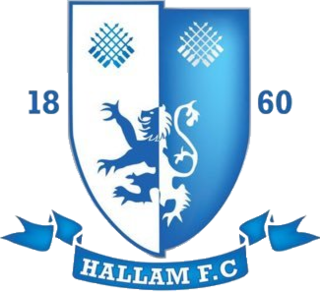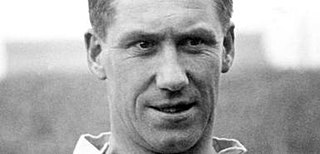Related Research Articles

Sheffield Wednesday Football Club is a professional association football club based in Sheffield, South Yorkshire, England. They compete in the EFL Championship, the second level of the English football league system.

Hallam Football Club is an English football club based in Crosspool, Sheffield, South Yorkshire. Founded in 1860, Hallam is the second oldest association football club in the world. Hallam have played at their Sandygate home in the Sheffield suburb of Crosspool since formation, with the ground being officially recognised by the Guinness Book of Records as "The Oldest Football Ground in the World". In 1867, the club made history by winning the world's first ever football tournament, the Youdan Cup.

William Henry Walker was a prominent English footballer of the 1920s and 1930s. He is considered by many to be one of the greatest footballers to ever play for Aston Villa and England. As a manager he won the FA Cup with each of Sheffield Wednesday and Nottingham Forest, some 24 years apart, a record which still stands.

Derek Dooley MBE was an English football player, manager and chairman. He lived in Sheffield for the majority of his life, taking roles at both Sheffield Wednesday and Sheffield United.

Sheffield has a long history of involvement in sport. Although cricket was the first organised sport, it has gradually been supplanted by football. Both the main two local football teams grew out of cricket teams. Sheffield can claim many firsts in football the most famous one being Sheffield F.C. being the world's first and oldest football club. Today it has a club in every major team sport in England. Sheffield became the first UK National City of Sport in 1995 and is now home to the English Institute of Sport (EIS).
The 1992–93 season was the 113th season of competitive football in England. The season saw the Premier League in its first season, replacing Division One of the Football League as the top league in England. Every team in the Premier League played each other twice within the season, one game away and one at home, and were awarded three points for a win and one for a draw.

The Steel City Derby is a local derby between Sheffield United and Sheffield Wednesday, the two professional football league teams in the city of Sheffield, England.

Wakefield Football Club was an English football club based in Wakefield, West Yorkshire. Originally based in the village of Emley, they were known as Emley A.F.C. from 1903 to 2002. The club relocated to Wakefield in 2000 and were renamed Wakefield & Emley in 2002. They were subsequently renamed Wakefield-Emley in 2004 and then just Wakefield in 2006, before being wound up in June 2014.
Ronald William Starling was an English footballer whose career lasted from 1926 to 1946. Starling was an inside forward who made 413 appearances in all competitions, never a high scoring inside forward he was a player who created chances for other players, notching a modest 65 goals throughout his career. His ball carrying ability earned him the nickname of "The Man with the Fluttering Feet".

James Marshall Seed was an English footballer and football manager.

The history of Sheffield Wednesday F.C., an English football club from Sheffield, dates back to the club's establishment in 1867. The club would see early regional success followed by a rocky transition to professionalism. Although it has spent the majority of its Football League years in the top flight, its position within the league has varied from the very top to almost slipping to the fourth tier.
Brian Joicey is a retired professional footballer who played as a forward for Coventry City, Sheffield Wednesday and Barnsley in a career that lasted from 1969 to 1979. Joicey did not play league football until he was 23 years old. In professional football he made 277 appearances and scored 100 goals. Following his football league career he returned to high level non-league football.
John Quinn was a professional footballer who played for Sheffield Wednesday, Rotherham United and Halifax Town. He also played for non league Worksop Town towards the end of his playing days. Johnny's professional career was long, lasting from 1959 to 1976 during which time he made 379 league appearances. Quinn played in the half back position or defensive midfielder but he could also play at fullback and winger if needed. He was relatively short of stature, being only 5 foot 6 inches (165 cm).
Joseph Bentley McClelland was an English football manager who was the first manager of Halifax Town. He also managed Lincoln City and was assistant manager at Sheffield Wednesday.
The 1991 Football League Cup Final was a football match played on 21 April 1991 between Manchester United and Sheffield Wednesday. It was the first of two years that the Football League Cup competition in English football was sponsored by Rumbelows.

John Edward Davison was an English footballer and manager who had a long and successful association with the football clubs of Sheffield, playing for Sheffield Wednesday for 18 years and later managing Sheffield United for 20 years. His fairness and diplomacy earned him the nicknames of "The George Washington of Sheffield football" and "Honest Ted". Davison played as a goalkeeper in a career, which lasted between 1908 and 1926, he made 424 appearances in all competitions for Sheffield Wednesday. Davison was only 5 ft 7 in tall, very small for a goalkeeper, but he made up for this with lightning reflexes and top class anticipation. He has gone down in football records as the smallest goalkeeper ever to play for England, making just one appearance for the national team in March 1922.
Mick Prendergast was an English professional footballer whose career lasted from 1969 to 1979 during which time he made a total of 232 appearances in all competitions, scoring 62 goals. He was a forward player who played for Sheffield Wednesday and Barnsley. Prendergast was a popular player in his time at Hillsborough and went by the nickname of "Prendo". Prendergast was born in the South Yorkshire village of Denaby Main on 24 November 1950.

Andrew McCulloch is an English former professional footballer who played for Queens Park Rangers, Cardiff City, Oxford United, Brentford, Sheffield Wednesday, Crystal Palace and Aldershot. He played a total of 475 games in all competitions for his seven league clubs, scoring 153 goals in a career which lasted from 1970 until 1985. McCulloch was a centre forward in the "target man" mould, being 6 ft 2in tall, he was good in the air, using his strong physique to hold off defenders and lay the ball off to teammates. He made one appearance for the Scotland national under 23 team.
Dennis Woodhead was a professional footballer whose career lasted from 1947 until 1959 during which time he played for Sheffield Wednesday, Chesterfield, Derby County and Southport. Woodhead was primarily a left winger who also played as a stand-in centre forward when needed. Throughout his career he made 343 appearances including FA Cup matches and scored 108 goals.
References
- ↑ Adrian Bullock‘s Wednesday Archive Gives short biography.
- ↑ "The Wednesday Boys", Jason Dickinson & John Brodie, Pickard Communication, ISBN 0 9547264 9 9, pages 340, Gives general biography.
- ↑ "Eric Taylor: A Biography", Andrew Cooper, A. Cooper Publications 2011, ISBN 978 0 9568647 0 3, Gives general biography.